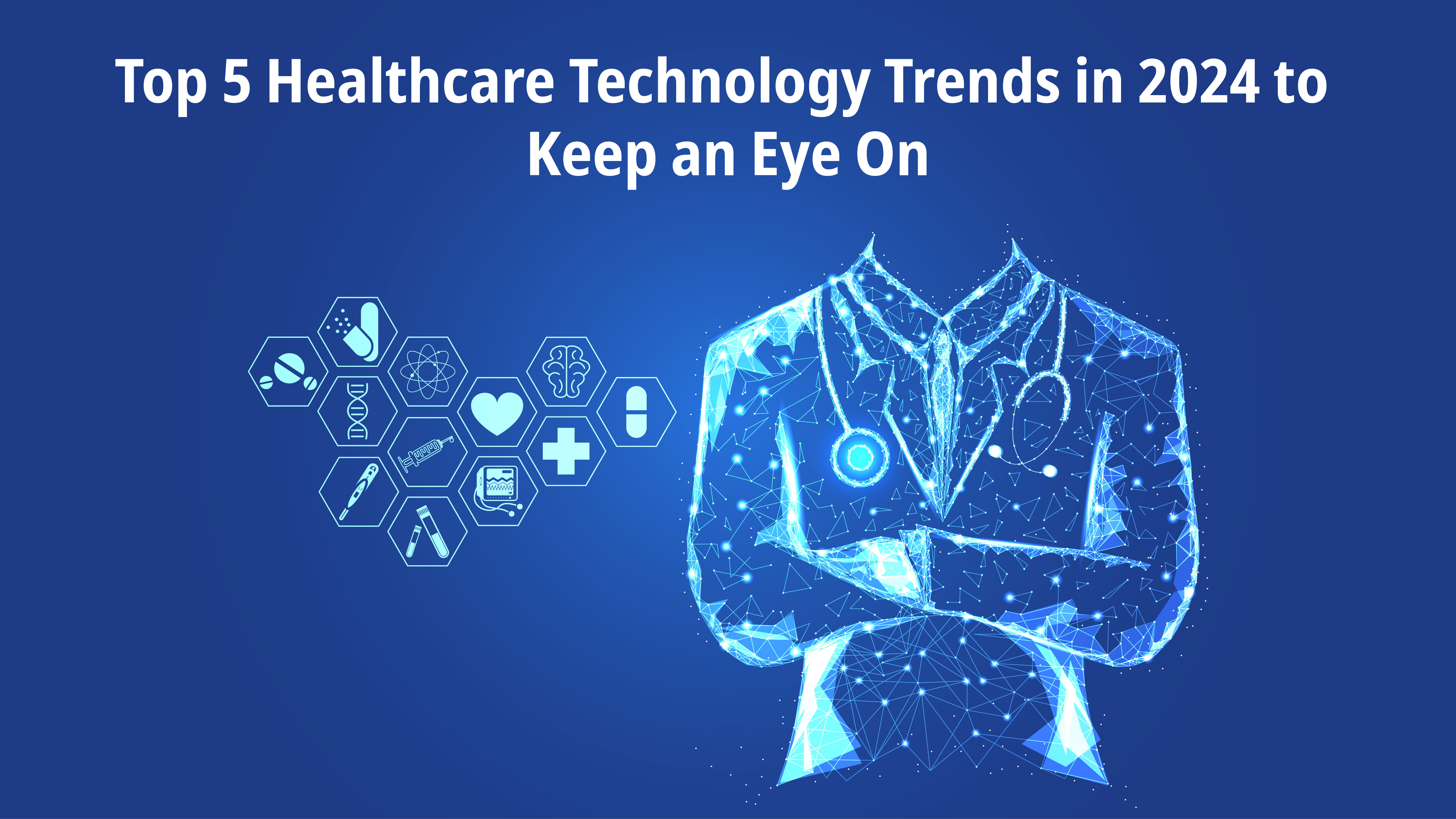The healthcare industry is brimming with advancements in technology to treat patients, create vaccines and medications, and promote healthier lifestyles. This paves the way for the escalating pathway of healthcare technology trends focused on improving the lives of humankind.
Multiple tech firms have concentrated their efforts over the past two years on using their knowledge to address issues brought on by the worldwide pandemic. Nevertheless, a lot of healthcare organizations that wouldn’t typically be thought of as tech firms have started to focus on technology and how it can change the way their products and solutions are delivered. This in turn has helped the healthcare industry to adapt to new tech trends to deliver their products/services.
Here’s a list of the top healthcare technology trends in 2024 that are revolutionizing the global healthcare industry for good.
Top 5 Healthcare Technology Trends in 2024 to Keep an Eye On

The HIMSS Future of Healthcare Study states that over the next five years, 80% of healthcare providers intend to increase their investments in technology and digital solutions. With companies utilizing technologies such as artificial intelligence (AI), cloud computing, extender reality (XR), and the Internet of Things (IoT), we will continue to see growth in industries like telemedicine, customized medicine, genomics, and wearables.
1. Telehealth
As we explore healthcare technology trends in 2024, telehealth emerges as a pivotal player, utilizing digitally stored data and communication technologies. The ultimate goal of telehealth is to make healthcare facilities accessible to people anywhere with just a click. It aims to make healthcare services more readily available. Telehealth brings along many services such as a patient portal, virtual appointments, remote patient monitoring, personal health apps, etc.
2. Artificial Intelligence
In a world where everything is available at a single click, the need for quick and automated responses for healthcare services is growing. Artificial intelligence is one of the major healthcare technology trends in 2024 that can provide such automated services. The healthcare sector can benefit from AI immensely by using it to collect, manage and process enormous user data. With AI it is also possible to create tools that efficiently spot patterns across huge datasets for accurate predictions and better patient outcomes.
3. AR/VR
Augmented reality and virtual reality are being used and implemented to better the patient as well as physicians’ experience. The application of VR in the healthcare industry can help in training physicians and surgeons to conduct and practice surgeries virtually. Whereas, AR assists surgeons in their day-to-day capabilities and helps future medical professionals to prepare for real-life surgeries. In a nutshell, both AR and VR will provide automated solutions to the healthcare industry, marking it one of the most popular healthcare technology trends in 2024.
4. Stimulations via Digital Twins
The practice of building models based on actual data that can be used to recreate any system or process is known as “digital twins,” and it is swiftly gaining popularity across a wide range of sectors.
This healthcare technology trend in 2024 includes the concept of the “virtual patient” — digital replicas of real people who are used to test medications and therapies to speed up the process of getting new products from the research stage to widespread use. At first, this might be limited to simulations or models of specific organs or systems. Although practical models that represent entire bodies are still a ways off, progress is being made. However current research indicates that this is still far from being a likely scenario, in 2024 we will likely see advances in this direction.
Digital twins of human organs and systems are a more realistic possibility; they let medical professionals study various pathologies and try out different treatments without endangering specific patients and negate the need for costly human or animal experiments. The Living Heart Project, which was started in 2014 to use crowdfunding to create an open-source digital twin of the human heart, is an excellent example. The Neurotwin project, a European Union Pathfinder initiative, investigates the relationship of electrical fields in the brain in the hopes of developing new Alzheimer’s disease treatments.
Digital twin technology is considered one of the most significant healthcare technology trends for 2024 because of its potential to assist the healthcare industry in developing medicines more swiftly and affordably.
5. Genomics and Customized Medicine
Historically, pharmaceuticals and therapies have been developed on a “one-size-fits-all” basis, with clinical trials planned to maximize pharmacological efficacy with the greatest possible patient population and the fewest possible undesirable side effects. Current technology, such as genomics, artificial intelligence, and digital twins, enables a far more individualized approach, leading to treatments that can be tailored right down to the individual level.
For instance, the Empa healthcare facility in Sweden uses artificial intelligence (AI) and modeling software to forecast the precise dosage of medications, including synthetic opioids like fentanyl, for each patient. When used in excessively high dosages, these drugs can be incredibly harmful but also extremely useful for individuals with chronic pain, altering their lives.
The pharmaceutical company Novo Nordisk partnered with the digital health business Glooko to develop personalized diabetes monitoring tools that offer tailored advice for nutrition, exercise, and illness treatment based on blood sugar readings and other parameters unique to each user.
The study of genes and, more recently, the application of technology to map individual genomes—the genetic structure of an organism, such as a person—are both crucial to developing personalized medicine. As a result of this fast, new medicines for major illnesses such as cancer, arthritis, and Alzheimer’s disease are being developed. A sub-field of genomics called nutrigenomics, which involves creating individualized food regimens with an emphasis on health based on various genetic characteristics, is another area that can be a key healthcare technology trend in 2024.
6. Robotics
Robotics is the most exciting tech trend in the healthcare industry. Robotics in the healthcare industry can help patients and medical staff by introducing assistive robots. Further, these robots can help patients with effective day-to-day health management and much more. Additionally, robotics can be used for mental health assistance and for consistently monitoring a patient’s health.
Ever since the pandemic happened, the healthcare industry has been evolving rapidly and constantly. With the healthcare technology trends in 2024, the next few years are about to pace up more with technological advancements and provide better and faster medical assistance.
Final Thoughts

As we look ahead to the future of healthcare, it becomes clear that keeping up with the latest trends in the healthcare industry is crucial for both stakeholders and professionals, especially in the context of evolving healthcare technology trends in 2024. The landscape is rapidly evolving, and embracing the latest trends in healthcare is essential for providing optimal patient care, streamlining operations, and fostering innovation. From innovative treatment modalities to data-driven decision-making, the industry is witnessing a transformative shift.
The integration of emerging healthcare technology trends is playing a pivotal role in shaping the sector’s trajectory. Whether it’s the adoption of artificial intelligence for diagnostics, telehealth solutions for remote patient monitoring, or blockchain for secure health data management, technological advancements are revolutionizing healthcare delivery. As we navigate the complexities of 2024, it’s crucial for healthcare professionals, organizations, and policymakers to align their strategies with the latest trends in the healthcare industry.




